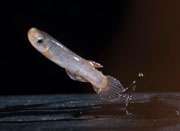New study shows cannibalistic fish refrain from eating their own embryos

Even though it is known to be a cannibal, the mangrove rivulus or killifish of the Americas will never eat one of its own embryos, even if it is hungry. This slender amphibious fish can recognize its own kin, even if these are still in the embryonic stage. This is according to a study by Michael Wells and Patricia Wright of the University of Guelph in Canada, in Springer's journal Behavioral Ecology and Sociobiology.
The animal world has many examples of so-called filial cannibalism, which refers to animals that eat their own offspring. Others partake in non-kin cannibalism in which they eat the offspring of other parents. According to Wells and Wright, the trick is to recognize the difference between your own versus someone else's offspring to optimize reproductive success. Previous fish studies showed that parents can assess the relative ratio of kin to non-kin embryos in an entire nest, but the ability to recognize single embryos has up until now not been demonstrated.
To investigate this question, researchers chose mangrove rivulus (Kryptolebias marmoratus) because this type of fish is not only able to survive on land but it is also hermaphroditic which means it self-fertilizes its eggs internally. The embryos that are released into the salty mangrove waters are genetically identical to the parent fish.
In a series of laboratory tests, researchers introduced a single embryo into water containing an unrelated adult fish, which was quick to investigate the embryo. But when an embryo which was related to the fish was introduced, the fish responded much more slowly.
The researchers found that fish that were fasted (so that they were hungry) investigated embryos about seven times faster than fed fish, which suggests that their hunger enhanced their curiosity. Their hunger, however, did not make a parent fish eat its own embryo. Adults also jumped at embryos placed on the water's edge. Once the embryos were successfully knocked into the water, adult fish would only consume unrelated embryos and ignore the rest.
"When a self-fertilizing mangrove fish was presented with a single embryo it never ate its own but consumed unrelated embryos," Wells explains. "This suggests that they have the ability to recognize solo relatives at very early stages of development."
The researchers believe that waterborne odors or chemical cues that the embryos naturally release during development likely play a role in the fish's ability to recognize their kin.
"To our knowledge, this is the first time that the ability to recognize the genetic relatedness of a single embryo by a fish has been described in the literature," Wright says.
More information: Michael W. Wells et al, Do not eat your kids: embryonic kin recognition in an amphibious fish, Behavioral Ecology and Sociobiology (2017). DOI: 10.1007/s00265-017-2360-y
Journal information: Behavioral Ecology and Sociobiology
Provided by Springer














